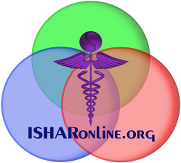Ayurveda > Ayurvedic Diet
List ISHAR Online Sources: Ayurveda > Ayurvedic Diet
Functional Summary
|
Modality |
|
Consumption of appropriate foods in appropriate order. |
|
Intention |
|
Balancing one’s personal doshas to promote health and prevent illness. |
|
Geo-Cultural |
|
Described in appendices of ancient Vedas. |
Topic Summary
Ayurvedic medicine, dates back about 5000 years, and believes humans are connected to the elements fire, water, earth, air, and ether. A person’s mental, emotional, and physical state are dictated by their body type, which is determined by their dominant doshas: kapha, pitta, and vata, which are combinations of those elements. The dietary aspect of Ayurveda focuses on how each of these doshas reacts to certain foods, believing that some foods may bring balance, or imbalance, depending on the dosha. It is important to note that an Ayurvedic diet is not any one specific prescribed diet, but is intended to be customized to an individual’s personal imbalances.
A key aspect of an Ayurvedic diet is the agni, or Digestive Fire. In order to be able to digest what is eaten, the agni must be strong. If not, the body produces toxins which could lead to ailments and illnesses. It is generally recommended that moderation be considered in all aspects to provide balance. Extremely cold food and beverage is to be avoided, and over-eating may also lead to imbalance. Additionally, eating foods that are thought to have similar properties at the same time is encouraged over mixing foods, which could smother the digestive fire. For example, bananas and milk are considered too different to be eaten together.
Research Summary
While substantial studies specifically on the medical benefits of an Ayurvedic diet are difficult to find, there have been several with promising results. A preliminary study in 2009 postulated that such diets had potential for helping manage weight, but cautioned that further, more closely controlled trials would be needed to substantiate the findings. A 2014 study found evidence to support Ayurveda’s claim that excessive intake of sour tastes contributed to a number of conditions including joint inflammation, dentine hypersensitivity, stomatitis, halitosis, heartburn, and papules. Additional research from 2014 connected the Vata dosha with Parkinson’s disease, by determining the doshas of 75 individuals with PD, and a control group of 73 individuals with no known neurological diseases. However, the study was admittedly conducted with some bias, as those who performed it generally subscribed to the idea that balancing doshas is an effective means of preventing disease.
Perspectives
ISHAR strives to present all of our data in an impartial, informative manner. Nonetheless, there are always different viewpoints on various topics, and ISHAR encourages users to review the perspectives on other informational sites, then come to their own conclusions regarding what they consider the least biased. The sites below were chosen to represent a wide spectrum of approaches to this topic, and none are endorsed or promoted by ISHAR itself.
- A Pro-Practice Website: http://www.doctoroz.com/article/ayurvedic-diet-how-eat-your-body-type
- An Anti-Practice Website: http://www.skeptic.com/eskeptic/13-10-09/
